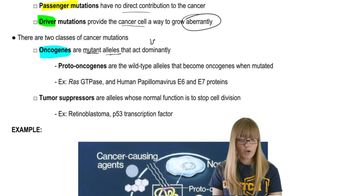Table of contents
- 1. Introduction to Genetics51m
- 2. Mendel's Laws of Inheritance3h 37m
- 3. Extensions to Mendelian Inheritance2h 41m
- 4. Genetic Mapping and Linkage2h 28m
- 5. Genetics of Bacteria and Viruses1h 21m
- 6. Chromosomal Variation1h 48m
- 7. DNA and Chromosome Structure56m
- 8. DNA Replication1h 10m
- 9. Mitosis and Meiosis1h 34m
- 10. Transcription1h 0m
- 11. Translation58m
- 12. Gene Regulation in Prokaryotes1h 19m
- 13. Gene Regulation in Eukaryotes44m
- 14. Genetic Control of Development44m
- 15. Genomes and Genomics1h 50m
- 16. Transposable Elements47m
- 17. Mutation, Repair, and Recombination1h 6m
- 18. Molecular Genetic Tools19m
- 19. Cancer Genetics29m
- 20. Quantitative Genetics1h 26m
- 21. Population Genetics50m
- 22. Evolutionary Genetics29m
19. Cancer Genetics
Cancer Mutations
Problem 29a
Textbook Question
Textbook QuestionSkin cancer carries a lifetime risk nearly equal to that of all other cancers combined. Following is a graph [modified from K. H. Kraemer (1997). Proc. Natl. Acad. Sci. (USA) 94:11–14] depicting the age of onset of skin cancers in patients with or without XP, where the cumulative percentage of skin cancer is plotted against age. The non-XP curve is based on 29,757 cancers surveyed by the National Cancer Institute, and the curve representing those with XP is based on 63 skin cancers from the Xeroderma Pigmentosum Registry.
Explain why individuals with XP show such an early age of onset.
 Verified Solution
Verified SolutionThis video solution was recommended by our tutors as helpful for the problem above
Video duration:
1mPlay a video:
Was this helpful?
Video transcript

 4:50m
4:50mWatch next
Master Cancer Mutations with a bite sized video explanation from Kylia Goodner
Start learningRelated Videos
Related Practice


